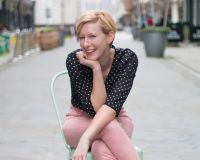Posted on Tue 13 Jul 2021
Always incomplete
There is loads to do, it feels thoroughly incomplete. Which is exactly how any project thinking about an equitable future should always be.
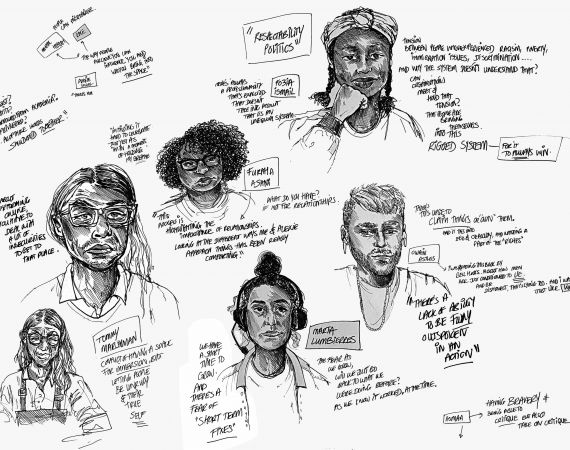
Posted by
Project
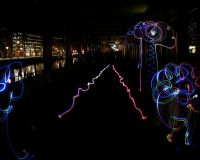
Towards Equitable Futures (2020)
We live in capitalism, its power can often seem inescapable - but then, so did the divine right of kings. Any human power can be resisted and changed by human beings. Resistance and change often begin in art. Ursula K. Le Guin, National Book Foundation Medal speech 2014 Towards Equitable…"Imagine a space where culture and community transcends the lines and limitations it constricts itself to. Imagine a space that always has space even when the physical space isn’t there. Imagine a space where humans are brought together not just by their commonality but by their proud differences.
A place for fragmented communities, and outsiders to share their stories and…"
Alexie Segal
In our last workshop with the visioning group for Towards Equitable Futures we talked a bit about incompleteness. About how we might end our sessions together with a necessary feeling of them not being finished, of us not being finished. We ran all of the workshops that we said we would, we developed a Three Horizons map for Watershed, we provoked a host of individual and collective ideas for what we might do next. Most importantly though, we created a space for thinking about the future which I believe felt equitable to those of us who were there, and that does not have an end date.
Below you will see snippets of those conversations as illustrated by the brilliant Jasmine Thompson which I share without conclusion or resolution but simply as testament that they happened.
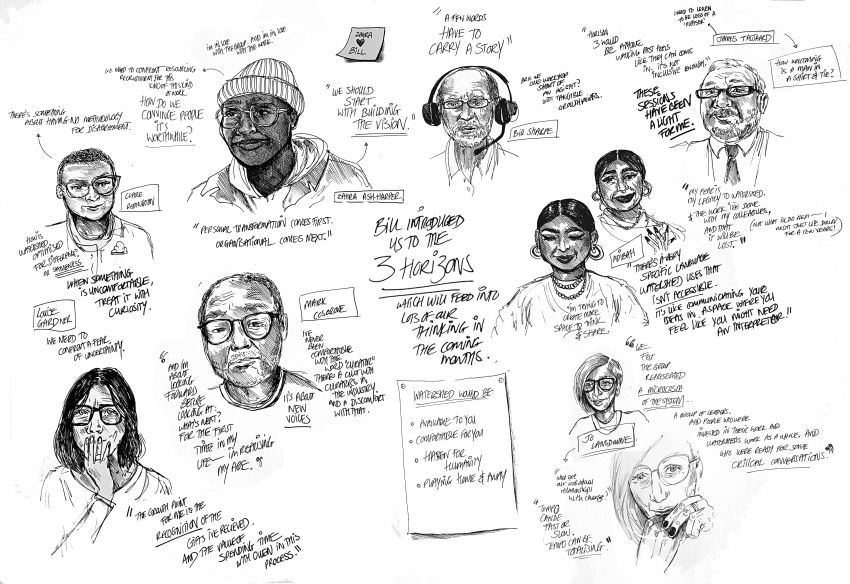
After tuning in to the mutual qualities of life (thanks to those who have pointed me towards Ubuntu and intra-action to develop my thinking) we spent time with the Three Horizons – moving from imagining a desirable future (third horizon), to reflecting on what currently exists that we may need to set aside (first horizon) and finally considering where the seeds of change might lie (second horizon). This process was largely led by Bill, who developed the model, working in partnership with Zahra with whom it is evolving to be more conscious of our internal experiences of external structures. We didn’t, for example, talk about what we felt others should do differently before we had reflected on our own individual relationship to change.
I am often impatient when it comes to change. This imperative towards action is part of why I like working at Watershed, we work quickly and get things done. While that creates a useful momentum, it can also get in the way of ensuring that there is space for the kind of deep dialogue that ensures full participation. Alongside our workshops I, with Clare, have been taking part in a course on Exploring Conflict which has emphasised the value of bringing together highly divergent ideas and opinions when making change. Conflict as a productive force, as a way in which a group thinks together and moves forward, has emerged as a very important idea for us this year. Understanding how we (as individuals, communities, cultural organisations, families…) walk towards sites of conflict while keeping people safe feels like an urgent question, but one that can’t be rushed.
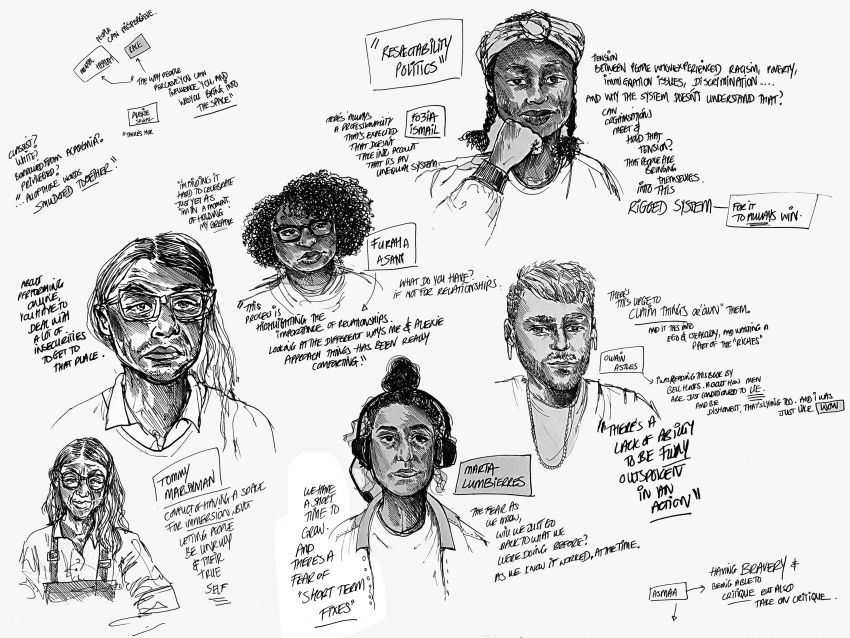
Our visioning group talked a lot about the ways in which Watershed itself might get comfortable with confrontation, both by standing up for what we believe in and by creating spaces where people are able to explore ideas and disagree with each other well. Core to this, as with me, is pace - knowing when to slow down enough to care fully. We talked about doing this close to home and further away as we both root ourselves within our immediate community and nurture an international perspective. We talked about how we make that work as available as possible to people through the language we use, our pricing models and the invitations we make.
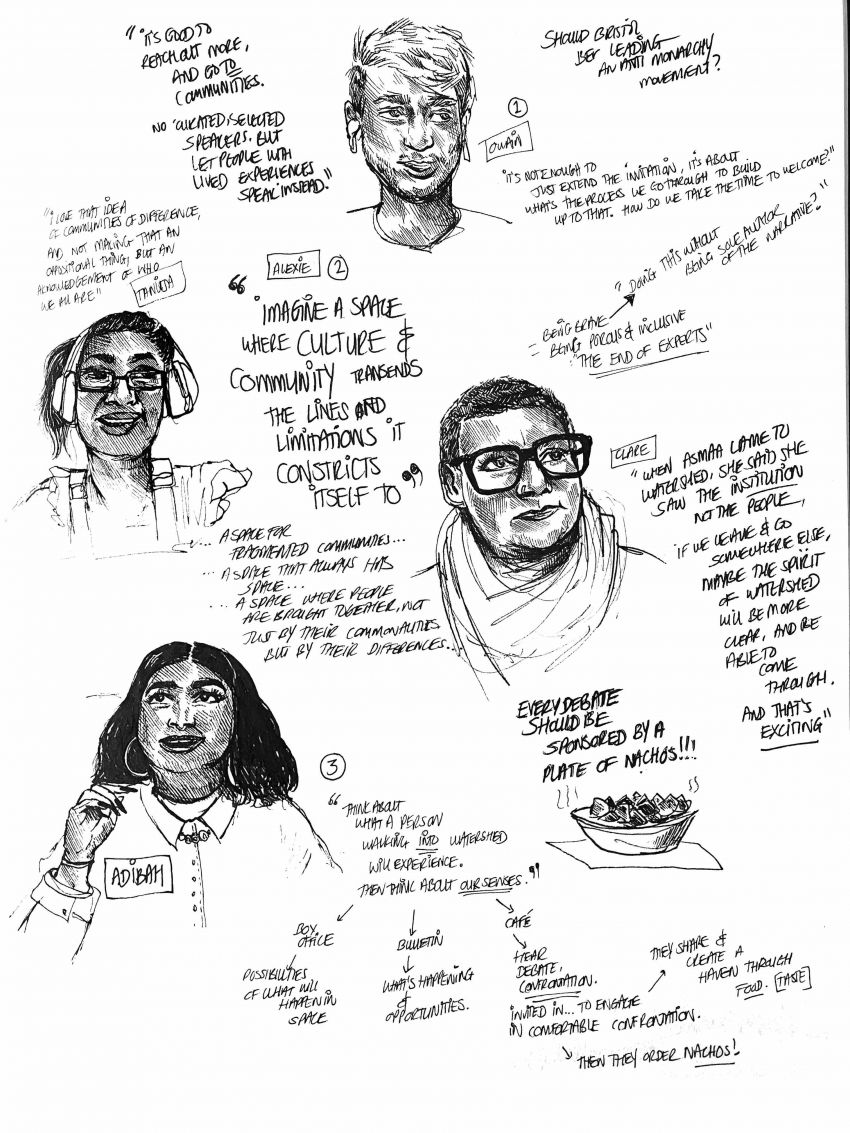
Watershed are hoping to do a few programming experiments around these ideas - with some of the group - over the next six months. There are many ways in which the insights from our Three Horizon map will start to inflect Watershed’s work, and I hope others’, as we move through this incredibly complex time and have more conversations (not least with our colleagues), though the map itself is not in a plan of action.
Alongside this Zahra and Bill are continuing to work together to codify and write up a methodology for the kind of work we have tried out in this project in the hope that we can all do more of it (with thanks to Bristol + Bath Creative R + D for their research support). This includes some reflection on how they developed the foundations of trust and equity in their professional relationship. Asmaa and Alexie will also reflect on their experiences of participating in our sessions on Rife.
As a group we are planning to come together in person when that is possible for all of us, to talk more about what we have been doing and to celebrate each other. There is loads to do, it feels thoroughly incomplete. Which is exactly how any project thinking about an equitable future should always be.
